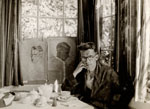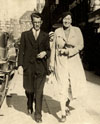An Angry Young Man

During the late 1920s until the late 1930s Sharp alternated periods of local government employment with periods of unemployment. The unemployment arose out of what became throughout Sharp's career a serial habit of falling out with employers and clients and resigning from jobs and commissions on points of principle or frustration. However, these hard times allowed him to devote time to writing polemical books about planning that effectively established him as a significant member of the profession.

In 1927 he became the Regional Planning Assistant to the South West Lancashire Joint Town Planning Committee. This occupied him for some four years, culminating in the large plan, The Future Development of South West Lancashire. This was the first significant professional work by Sharp. As was the tradition, authorship was assigned to the Joint Committee's Honorary Surveyor who had had virtually no hand in its preparation, which enraged Sharp. The bitter dispute which resulted was followed by two and half years of unemployment. But Sharp's period of notice from the Liverpool post had allowed him to start work on what was to become, in 1932, his first book, Town and Countryside, which was both well-reviewed and controversial, in its assault on prevailing garden city principles.
Sharp felt he had been blacklisted from planning employment on account of his stance in Liverpool but he was eventually to find work shortly after the publication of Town and Countryside. He had been living back in his native County Durham and the new position was as Regional Planning Assistant to the North East Durham Joint Planning Committee. He was sure that this success was because he was a local man and that his employers were ignorant of his book and indeed would not have employed him had they known of it. He hated the job, but enjoyed getting to know the City of Durham for the first time in his life. He also found time to write. This included a treatise against the appalling conditions found in his native part of the County, A Derelict Area, a series of articles for the Architectural Review on the historical development of the English Town, which became the book English Panorama, the Shell Guide to Durham and Northumberland and a chapter in Clough Williams-Ellis' book Britain and the Beast. This period also saw Sharp's first activism in the Town Planning Institute, including a bruising experience presenting a paper on Segregation in Town Planning, and a role in the creation of a Planning Officers' Section for local authority members of the consultant-dominated Institute.

Sharp tolerated the Durham job for four years before resigning in 1937. This time his period of unemployment was to be shorter; after three months he was invited to do some short-term teaching of town planning at the School of Architecture, King's College, Newcastle. This led to a permanent position and whilst the post was relatively junior, and University life did not always suit Sharp, this can be seen as a turning point. It was the end of Sharp's often unhappy days working for local government and the beginning of a period when new opportunities began to open up thick and fast, many as a result of war-time activity on planning. Whilst the ten years before had contained many lows it had also seen Sharp established as an important commentator on planning matters. The next ten years would see him rise to the summit of the profession and established as an important writer of plans.




